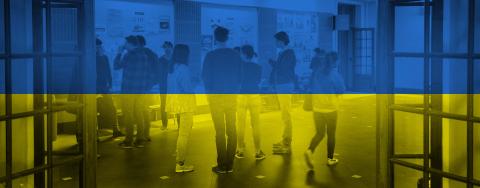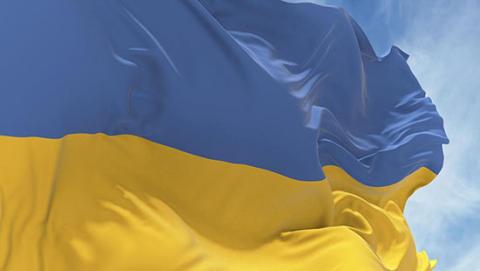
Ukraine: €500,000 in Funding to Host Students and Researchers
"Universities, as autonomous institutions, can also make policy choices and advocate for reasonable decisions to be made." Guillaume Fiquet, vice president of Sorbonne University in charge of international relations and territorial and socio-economic partnerships, as told to News Tank on 07/21/2022.
Guillaume Fiquet looks back on the support given by the university for Ukrainian scholars and students in exile since the outbreak of war in late February. "Temporary protection was granted to Ukrainian students, but initially only to those displaced after 24/02, effectively excluding a non-Ukrainian but French-speaking displaced population. We decided to expand the group of students to include those who had been excluded from the original guidelines because we believed it was our role also to take care of these students."
Among the measures taken by Sorbonne University has been the release of €500k from the French ‘Idex’ Excellence Initiative funds, to support measures for university students affected by the crisis, and the reception of exiled students. "To put it in perspective, the Île-de-France region is releasing 1 to 1.5 million euros, so there is currently little public funding available," the university points out.
Guillaume Fiquet adds: "It was a question of responding to an immediate demand. But the €500k is only the tip of the iceberg, albeit an important one.”
For the reception of students in exile in 2022-2023, the university has set up a dedicated procedure, "with a single address to send a single file," in parallel with the Campus France procedure.
Both emergency and permanent measures
Sorbonne University implemented three emergency actions at the beginning of the conflict:
- The return of all Sorbonne University students studying in Russia back to France, with the exception of one binational Franco-Russian student.
- The deployment of emergency aid, both material and psychological, to members of the Sorbonne University community affected by this crisis, "with no discrimination between Russian and Ukrainian nationals, who are suffering the consequences of this war.”
- When the conflict started, Sorbonne University had about 100 Ukrainian staff and students and more than 200 Russian students and staff.
- The suspension of all institutional cooperation with Russia (such as academic agreements, missions and joint seminars), in line with the decision of the European Union member states. "These measures have particularly affected the Faculty of Arts and Humanities, including the CUF (French University Colleges in Russia), but also many laboratories within Sorbonne University that have established strong links with Russian research laboratories. Sorbonne University is, nevertheless, committed to ensuring that students in a French-Russian bi-diploma program can finalize their theses with French professors independently of the CUFs and support it with their home institution.
Opening of additional places
The university has also opened additional places for Ukrainian, Russian and Belarusian students. "For the end of the 2021-2022 academic year, emergency reception measures have been established with the help of Sial (Service d'innovation pour l'apprentissage des langues) and the DU Respé (diplôme universitaire de retour aux études supérieures des personnes exilées), allowing students to extend their stay in France and have a break to prepare for the next academic year. Forty-five additional places were financed at Sial for FLE (French as a Foreign Language) courses.”
Sorbonne University has also submitted about 15 applications to the Pause program to authorize stays of varying lengths.
We have identified rooms available at the Crous, we have a few rooms at the CIUP, our social services have been very active, and we have made use of all our networks, external and internal, including informal ones.
A hundred students have already registered for 2022-2023
For the reception of students in exile in 2022-2023, the university preferred to set up a dedicated procedure that would allow it to have more information on the students' backgrounds than the Campus France procedure provides, and to be able to better refer them to resources.
"Sometimes students send in applications for courses that we don't offer, so the teams try to refer them to nearby institutions. There's also a special process for medical school applications, but we haven't had any requests."
At the end of July, the university had:
- "128 contacts interested in enrolling in the Faculty of Science, and 72 files submitted, which means that some are leaving for other institutions or countries. Of these 72, half have been admitted or are in the process of registering, the other half are still being examined by the university offices. Most of them are French speaking students who were studying in Ukraine.
- 25 applications in the Faculty of Arts and Humanities, of which 24 have been accepted, and 16 are Ukrainian students. These are mainly registrations for the first year of the bachelor’s.
Guillaume Fiquet indicates that it is difficult to make a global estimate. "For the moment, we don't have the impression that we are being overwhelmed by a wave of applications. We will be able to push the walls a little if necessary, particularly to increase the capacity of the DU Respé and FLE. We will decide when the new school year starts. And it should also be noted that we are beginning to see people returning to Ukraine, particularly from researchers in the framework of Pause. This is quite understandable.”
Differentiated fees: "It would be cynical to impose them"
When asked if Ukrainian students from outside the European Union could be exempted from differential fees, even beyond the 10% provided for by Bienvenue en France, Guillaume Fiquet said: "It would seem very cynical to impose these fees on them, but this is a point that we have not yet discussed. It would be unreasonable not to exempt them. And since I feel like we don't have an uncontrollable wave, it should be manageable. When we're forced to make choices, we'll see."
Relations with Russia: “Universities will surely be the first to initiate the resumption of contacts”
"More and more requests from professors and researchers are coming in to see if they can host Russian students, doctoral students or post-docs. From the beginning, Sorbonne University has been clear: it is out of the question to reduce the reception to a simple criterion of nationality. When students were in financial difficulty, we did not look at their nationality. And when we look at the motivations of the Russian students who want to join us, we see that some of them indicate that they are at odds with their country and it is good to help them take the step," says the Vice President.
He adds: "As an individual, as an academic researcher, we can keep links with Russian colleagues with whom we have always worked, but when it comes to partnership relations or co-tutoring agreements, it is no longer possible for the moment.
"One day, these relations will resume, and the universities will surely be the first to resume contacts, because the academic and university fabric persists. And these are strong connections that share certain values. These relations have often gone beyond conflicts, even if today we are severely impeded."
A recomposition of the world’s equilibrium in progress
For Guillaume Fiquet, this war is already showing longer term impacts. "After 24/02/2022, there was a recomposition of the world’s equilibrium, which also affected universities. With the idea that from the point of view of international relations, universities must choose or modify partners in whom they have confidence."
According to him, this trust has already taken place within Europe: "At Sorbonne University, we have seen it with the strengthening of our European alliance. But we have also seen a new interest in us from Canada, as well as from Australia, which is showing its desire to reestablish strong ties with European universities, not to mention the United States, which is very present on our doorstep.”
He adds, however, that not all countries have yet positioned themselves, "especially in Latin America and Africa."
4EU+ Alliance: support for universities in Warsaw and Prague
"I visited the 4EU+ partner universities: many were stunned, especially those in Warsaw and Prague, which were immediately more concerned with health than education," says Guillaume Fiquet. He indicates that this is the subject of regular discussions between the members in order to work together on this aspect.
"The idea is for these two universities to be the entry point for Ukrainian students, but not the only destination. The other member universities of the Alliance should be able to accept Ukrainian students as soon as the maximum capacity is reached in these two universities. The solidarity movement will gain momentum in the new school year."
Article published following the interview of Guillaume Fiquet, Vice President of Sorbonne University in charge of international relations and territorial and socio-economic partnerships, by journalist Audrey Steeves.

